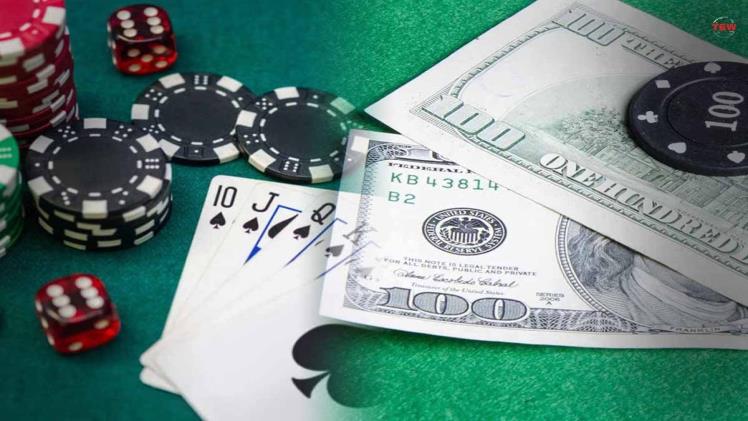
Casino gambling offers excitement, entertainment, and the potential for big wins—but without proper money management, it can also lead to serious losses. Whether you’re a casual slot player or a serious poker enthusiast, managing your bankroll effectively is the foundation of responsible gambling.
Bankroll management refers to how you budget, track, and control the money you allocate for gambling. It’s a simple concept with powerful results: by planning how you spend your gambling funds, you can play longer, reduce stress, and make better decisions at the table or the machine.
In this article, we’ll explore what bankroll management is, why it matters, and how to apply it to your next casino session.
What Is a Bankroll?
A bankroll is the specific amount of money set aside exclusively for gambling. It should be money you can afford to lose—never rent, bill, or grocery money.
The size of your bankroll depends on your financial situation and how often you play. A casual weekend player might have a bankroll of $100, while a regular online poker player might work with several thousand dollars.
What matters most is that the money is separate from your everyday finances and is treated like an entertainment expense—just as you would budget for movies or dining out.
Why Bankroll Management Matters
- Avoids Overspending
Without a limit, it’s easy to get caught up in the excitement of the casino and spend far more than intended. Bankroll management keeps you grounded.
- Reduces Emotional Decisions
When you’re chasing losses or feeling pressured to win, you’re more likely to make reckless bets. A solid bankroll strategy helps you stay calm and rational.
- Extends Play Time
With the right bet sizing and session limits, even a modest bankroll can stretch across hours of play. That means more fun and more chances to win.
- Builds Discipline
Good bankroll habits develop discipline that can help with other aspects of life, especially where money is concerned.
- Improves Long-Term Success
In games that involve strategy—like poker, blackjack, or sports betting—sticking to a bankroll plan ensures you can weather losing streaks and stay in the game.
Setting a Gambling Budget
Start by deciding how much money you can comfortably set aside each week or month for casino gambling. This is your total bankroll.
Example:
- Monthly discretionary income: $500
- Monthly gambling bankroll: $100
That $100 becomes your ceiling—no topping it up from your credit card or dipping into savings if you lose it early in the month.
Next, divide your bankroll into smaller chunks for each session or trip. If you plan to play four times a month, that’s $25 per session.
Choosing the Right Bet Sizes
One of the most important aspects of bankroll management is betting the right amount relative to your total bankroll. A good rule of thumb is:
- Never risk more than 1–5% of your bankroll on a single bet or hand
For example, with a $500 bankroll:
- Conservative: Bet no more than $5–$10 per round
- Moderate: Bet up to $25 if the game offers a low house edge
- Aggressive: Higher bets are possible, but only if you can handle the swings
The smaller your bets, the longer your bankroll will last—and the more chances you’ll have to hit a winning Casino 78win.
Tracking Your Results
Many players make the mistake of not keeping records. But if you want to take casino gambling seriously—or simply stay in control—it’s helpful to track:
- Wins and losses per session
- Time spent playing
- Bet types and game types played
- Total bankroll growth or decline
Even a simple notebook or spreadsheet can help identify patterns, spot areas for improvement, and prevent guesswork about how you’re doing.
Knowing When to Walk Away
A big part of bankroll management is knowing when to call it a day.
Set these limits before each session:
- Loss limit: The maximum amount you’re willing to lose (e.g., 50% of your session bankroll)
- Win goal: A target amount at which you’ll walk away (e.g., doubling your session money)
Sticking to these limits avoids emotional chasing behavior. It also reinforces the idea that gambling is a game of chance—not a way to make money on demand.
Bankroll Tips for Different Games
Slots: Choose machines with low minimum bets if your bankroll is small. Avoid max-bet strategies unless your bankroll can handle heavy variance.
Blackjack: Learn and follow basic strategy to reduce the house edge. Bet sizing should be based on your comfort with 78win.
Poker: Play stakes where you can afford to lose 20–30 full buy-ins. This gives you enough buffer for bad runs.
Roulette and Other Table Games: Stick to outside bets (red/black, odd/even) for lower volatility. Avoid risky inside bets unless they fit your risk profile.
Red Flags and When to Reassess
If you find yourself:
- Frequently exceeding your limits
- Gambling with borrowed money
- Hiding losses from friends or family
- Chasing losses with larger bets
It’s time to pause and reassess your relationship with gambling. In such cases, it’s best to seek support or set a break period to regain perspective.
Final Thoughts
Bankroll management is one of the few things you can fully control in a casino gambling environment. While you can’t change the odds or influence random outcomes, you can decide how much you’re willing to spend, how long you play, and when to walk away.
By treating your bankroll like any other budget—planned, disciplined, and tracked—you give yourself the best chance to enjoy gambling responsibly and sustainably.
Whether you’re playing for fun, for profit, or for the thrill, managing your money wisely ensures that the experience stays enjoyable—and under control.